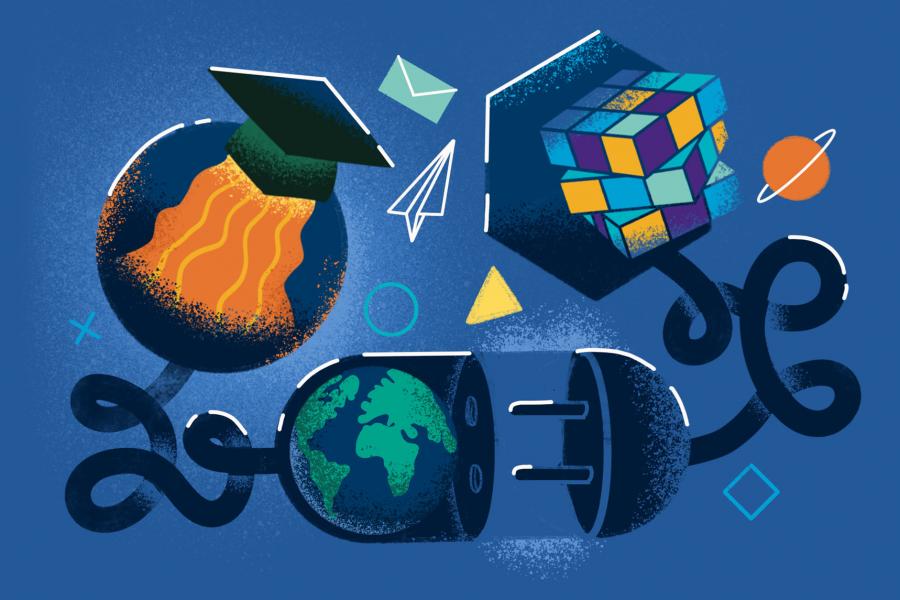
The Connection between Humanities and Science
Often students in high school express their love for both humanities and science subjects and are at a loss to understand how they do not need to choose one over the other. Little do they know that in the current, modern academic landscape these disciplines that were viewed as separate entities, in reality, are deeply and intricately connected to each other. The connection between how Biology and History, Philosophy and Physics, and English and Scientific Research intersect allows us to appreciate the full spectrum of human knowledge and progress.
Biology and History: The Evolution of Life and Civilization
History and Biology share a common goal: to understand the development of life and civilization over time. History chronicles human advancements, while biology examines the evolutionary and genetic factors that have shaped our species. All of humanity has worked through centuries that have revolutionized our understanding of human ancestry. Whether it is the discovery of DNA or the eternal quest for immortality, civilizations have developed coping strategies that are evident from the Egyptian burial (Mummification) system or Qin Shi Huang of the Chinese dynasty sending emissaries to far-off lands to find the antidote to death. Hence it is the human psychology of wanting to be immortal that governs the discoveries of cures and medicines, helping us rewrite historical narratives.
Tracing the study of diseases through history brings us upclose to modern epidemiology. Analyzing past pandemics, historians and scientists collaborate to predict and mitigate future outbreaks. Infact studying how the history of how deadliest pandemics have shaped our world provides an interdisciplinary framework to understand how societies rise and fall.
Philosophy and Physics: Understanding Reality
Physics and Philosophy are pretty much like cousins as they both seek to answer fundamental questions about the nature of reality. While Physics is concerned with unraveling the complexities of the universe from the smallest to the largest scale; providing empirical data on matter, space, and time, Philosophy deals with basic questions: where have we come from, what there is, and how we came to know about it. Philosophers such as Aristotle and Descartes are credited for shaping early scientific thought, and physicists like Einstein and Heisenberg tackled questions with tremendous philosophical implications. The MIT Press reader says that ‘Physicists Have Always Been Philosophers’: In Conversation With Frank Wilczek | The MIT Press Reader and “The cutting edge of new knowledge is the product of collaboration across traditional disciplinary boundaries.” Physics and Philosophy are intertwined and each continues to contribute to developments in the other. It is quite possible to study Classical mechanics and special relativity along with elements of deductive knowledge.”The Oxford research group in Philosophy of Physics is the largest in the world, with interests ranging from classical space-time theories and foundations of classical statistical mechanics, to quantum mechanics, quantum field theory and quantum gravity” Moreover, the philosophy of science helps physicists critically examine the foundations of their theories.
English and Scientific Research: The Power of Communication
Communication is the key to articulating scientific discoveries which can otherwise lose their impact. This is where the power of language comes in. Every scientist needs to have brilliant writing skills in order to publish research papers, write proposals to secure fundings, engage in public speaking and give presentations.
Historical figures have written compelling narratives that contributed to shaping public understanding of science. Science students who have read Galileo Galilei’s – His Dialogue Concerning the Two Chief World Systems (1632), would agree to the conversational format adopted by him, making complex astronomical ideas easily understood. To challenge beliefs, the rhetoric needs to be strong and compelling as we see how he challenged the prevailing geocentric beliefs. Another famous work is that of Carl Sagan’s book Cosmos which was made into a TV series that brought astrophysics to the mainstream thereby inspiring generations of physicists. Darwin’s “On the Origin of Species” was a combination of meticulous observation with clear, persuasive writing, making evolutionary theory accessible.
If you have a flair for writing, science journalism, writing science books and TED talks highlight the importance of storytelling in science. Hence most colleges and universities in the U.S. universities require students to take one or two writing courses during their first year to fulfill their general education requirements, which lay the foundation for writing.
Conclusion: The Power of Interdisciplinary Thinking
The inherent connection between science and humanities broadens our capabilities toward addressing complex global problems. Whether it is reviewing historical data to understand pandemics or interpreting physics through philosophical thoughts, or even crafting narratives to communicate scientific breakthroughs, interdisciplinary thinking is essential.
By recognizing and embracing these connections, we can develop a more holistic approach to learning and innovation—one that values both empirical evidence and humanistic inquiry in shaping our understanding of the world.






